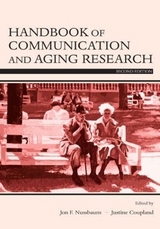
Handbook of Communication and Aging Research
Lawrence Erlbaum Associates Inc (Verlag)
978-0-8058-1453-8 (ISBN)
- Titel erscheint in neuer Auflage
- Artikel merken
Simultaneous growth in the discipline of communication and in the population of elderly individuals across the world has produced an explosion of research investigating various aspects of communication and aging. This is evidenced by the creation of specific divisions of the Speech Communication Association dedicated to providing a scholarly outlet for researchers investigating the aging process; conferences dedicated to addressing issues of language and aging; new journals dedicated to exploring communication and aging; and numerous special issues of well established journals edited by communication and aging scholars. Traditional gerontology -- which for the most part has been heavily influenced by theories in mainstream biology, psychology, sociology, social work, and medicine -- has focused on demography, personality, health, attitudes and housing issues. Social gerontology is new, prolific, and innovative, but still heavily reliant upon traditional theories and methodological approaches.
To give us access to the social process of aging, this handbook moves beyond traditional notions of describing and explaining the aging process by focusing upon the "social imagery" of aging and the way in which aging is socially constituted and constructed. The editors consider communication not as an adjunct to the aging process but as the major way in which aging can be understood. To understand how individuals adapt to aging, how relationships are defined as we grow old, how doctor-elderly patient interactions are negotiated, how older workers in an organization are construed and treated, or how images are portrayed in the media and affect an audience cannot be explored other than through communication. This volume's main purpose is to synthesize and analyze the vast amount of research concentrating upon communication and aging which has been published in numerous international outlets over the previous two decades.
Contributors are scholars from both North America and the United Kingdom who are experts and active researchers in the content of their particular chapters. These authors review and analyze the current literature so that readers are well informed as to future trends in both theoretical development as well as the practical results of communication and aging research.
Contents: Preface. Part I: The Experience of Aging. M. Hepworth, Images of Old Age. P.G. Coleman, Facing the Challenges of Aging: Development, Coping, and Meaning in Life. Part II: Language and Social Aging. N. Coupland, J. Coupland, Discourse, Identity and Aging. M.L. Hummert, J.L. Bonnesen, T.A. Gartska, Cognitive Processes Affecting Communication With Older Adults: The Case for Stereotypes, Attitudes, and Beliefs About Communication. J. Harwood, H. Giles, E.B. Ryan, Aging, Communication, and Intergroup Theory: Social Identity and Intergenerational Communication. Part III: The Communicative Construction of Relationships in Later Life. K.L. Henwood, Adult Parent-Child Relationships: A View From Feminist and Discursive Social Psychology. M-L. Mares, M.A. Fitzpatrick, The Aging Couple. V.C. McKay, R.S. Caverley, Relationships in Later Life: The Nature of Inter- and Intragenerational Ties Among Grandparents, Grandchildren, and Adult Siblings. W.K. Rawlins, Friendships in Later Life. Part IV: Organizational Communication. A.L. Balazs, Marketing to the Elderly. M. Bernard, C. Phillipson, Retirement and Leisure. Part V: Political and Mass Communication. W.T. Coombs, S.J. Holladay, The Emerging Political Power of the Elderly. L.L. Kaid, J. Garner, Political Advertising and the Elderly. J.D. Robinson, T. Skill, Media Usuage Patterns and Portrayals of the Elderly. Part VI: Health Communication. A.E. Beisecker, T.L. Thompson, The Elderly Patient-Physician Interaction. K. Grainger, Communication and the Institutionalized Elderly. K.S. Rook, Support, Companionship, and Control In Older Adults' Social Networks: Implications for Well-Being. Part VII: Educational Gerontology. F. Glendenning, Education for Older Adults: Lifelong Learning, Empowerment, and Social Change.
| Erscheint lt. Verlag | 13.10.1995 |
|---|---|
| Verlagsort | Mahwah |
| Sprache | englisch |
| Maße | 152 x 229 mm |
| Themenwelt | Sozialwissenschaften ► Kommunikation / Medien ► Kommunikationswissenschaft |
| Sozialwissenschaften ► Soziologie ► Mikrosoziologie | |
| ISBN-10 | 0-8058-1453-1 / 0805814531 |
| ISBN-13 | 978-0-8058-1453-8 / 9780805814538 |
| Zustand | Neuware |
| Haben Sie eine Frage zum Produkt? |
aus dem Bereich



